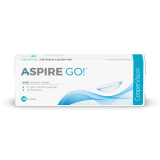Wearing and caring for contacts in a way that keeps your eyes and vision at their best is more involved than simply wearing glasses. But what’s the appropriate age to start wearing contacts? Here are some tips and considerations for navigating that first time wearing contact lenses.
Can kids wear contact lenses?
While there may be no minimum or recommended age for wearing contact lenses, it’s still important to consider whether contacts are appropriate. This decision has less to do with age than with your child’s unique traits and context. Here are some tips for evaluating whether your child is ready to wear contacts.
Deciding on contact lenses for children
Wearing contacts requires responsible wear and care. While complications seldom occur (affecting only 5% of wearers annually), most arise when contacts are worn or managed improperly.
Can your child handle this responsibility? Does she learn instructions well? Does he regularly do his chores without reminding? Does she forget her homework at home? Think about whether your child can learn how to properly insert and remove contacts, even when tired, keep lenses clean, and follow a regular wear schedule.
Does your child need contacts? Is your eye doctor suggesting contacts? Does your child want them for better performance in sports? If the concern is purely cosmetic, consider chatting with your child about any underlying issues or peer pressure that might be driving his or her desire.
When to wear contact lenses
For many people, contact lenses are a cosmetic, as well as a practical, decision. If your child or teenager doesn’t need prescription contact lenses but just wants to look cool (or to top off an awesome costume), many coloured contacts or Halloween contact lenses can be found online. However, parents should beware: when you buy contact lenses online, they may not be FDA approved. Always check with your eye doctor first.
Some benefits of contact lenses
Prescription contacts can often make our lives a lot easier. While they require responsible care, they can also:
- Give you a wider range of vision
- Enhance your sports performance and experience
- Offer a better visual experience when prescribed correctly
Remember, healthy eyes mean good vision. Talk to your eye doctor whenever you consider wearing contact lenses or other decisions about your vision.






